人教版(2019) 必修第二册 Unit 4 History and Traditions 单词及重点句式课件(78张)
文档属性
| 名称 | 人教版(2019) 必修第二册 Unit 4 History and Traditions 单词及重点句式课件(78张) |

|
|
| 格式 | pptx | ||
| 文件大小 | 7.8MB | ||
| 资源类型 | 教案 | ||
| 版本资源 | 人教版(2019) | ||
| 科目 | 英语 | ||
| 更新时间 | 2022-03-17 00:00:00 | ||
图片预览



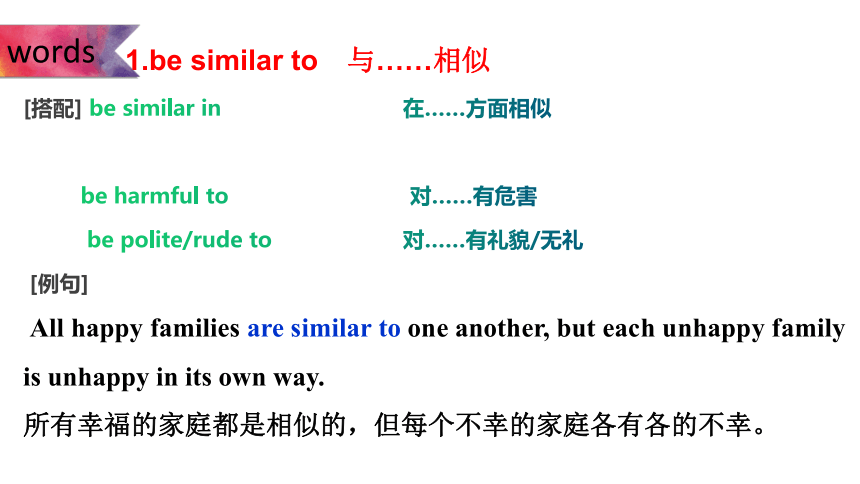

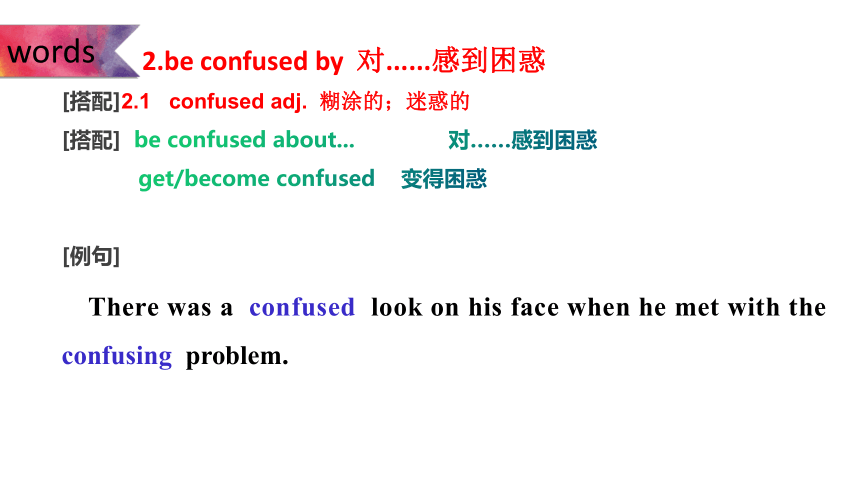
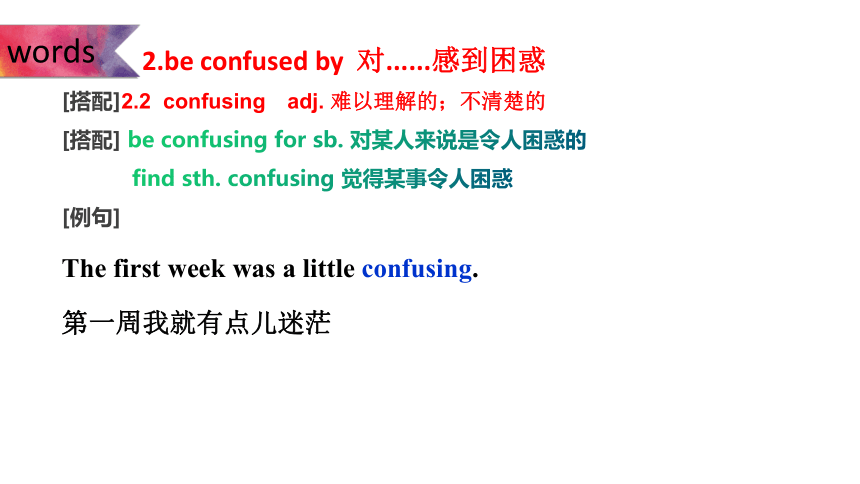
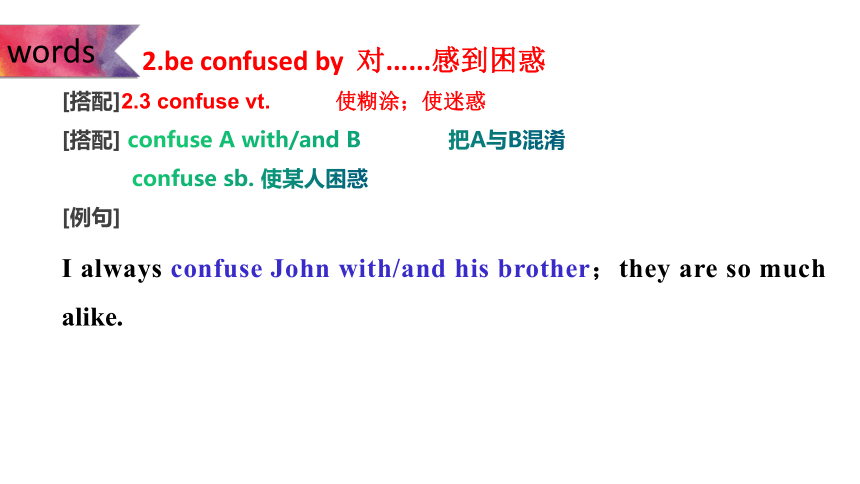

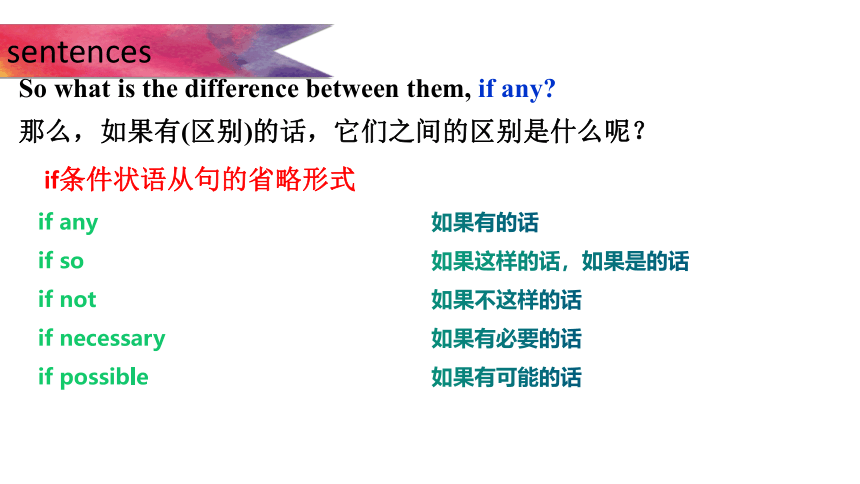
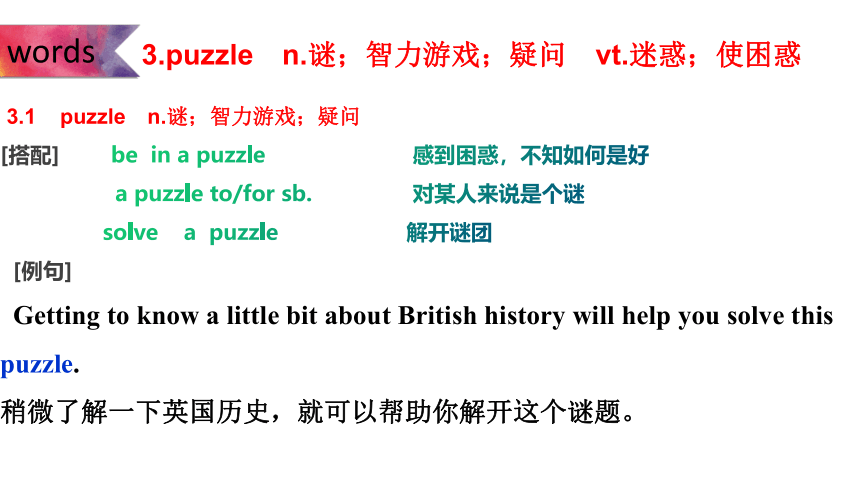
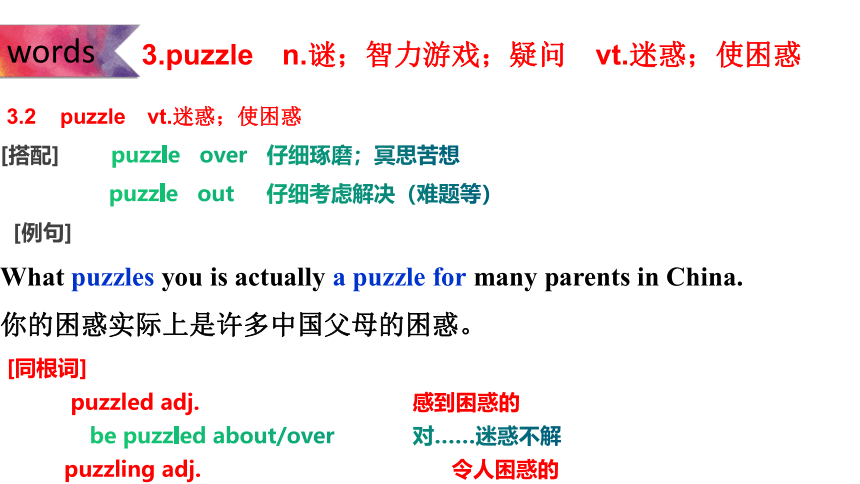
文档简介
(共78张PPT)
u n i t 4
01
02
03
04
Listeng and Speaking
Reading and Thinking
Useful Structures
Reading for Writing
01
PART ONE
Listening and Speaking
[搭配] be similar in 在……方面相似
be harmful to 对……有危害
be polite/rude to 对……有礼貌/无礼
[例句]
All happy families are similar to one another, but each unhappy family is unhappy in its own way.
所有幸福的家庭都是相似的,但每个不幸的家庭各有各的不幸。
1.be similar to 与……相似
words
02
PART TWO
Reading and Thinking
[搭配]2.1 confused adj. 糊涂的;迷惑的
[搭配] be confused about... 对……感到困惑
get/become confused 变得困惑
[例句]
There was a confused look on his face when he met with the confusing problem.
2.be confused by 对......感到困惑
words
[搭配]2.2 confusing adj. 难以理解的;不清楚的
[搭配] be confusing for sb. 对某人来说是令人困惑的
find sth. confusing 觉得某事令人困惑
[例句]
The first week was a little confusing.
第一周我就有点儿迷茫
2.be confused by 对......感到困惑
words
[搭配]2.3 confuse vt. 使糊涂;使迷惑
[搭配] confuse A with/and B 把A与B混淆
confuse sb. 使某人困惑
[例句]
I always confuse John with/and his brother;they are so much alike.
2.be confused by 对......感到困惑
words
[搭配]2.4 confusion n. 混乱;困惑
[搭配] to avoid confusion 为了避免混淆
in confusion 困窘的
2.be confused by 对......感到困惑
words
So what is the difference between them, if any
那么,如果有(区别)的话,它们之间的区别是什么呢?
if条件状语从句的省略形式
if any 如果有的话
if so 如果这样的话,如果是的话
if not 如果不这样的话
if necessary 如果有必要的话
if possible 如果有可能的话
sentences
3.1 puzzle n.谜;智力游戏;疑问
[搭配] be in a puzzle 感到困惑,不知如何是好
a puzzle to/for sb. 对某人来说是个谜
solve a puzzle 解开谜团
[例句]
Getting to know a little bit about British history will help you solve this puzzle.
稍微了解一下英国历史,就可以帮助你解开这个谜题。
3.puzzle n.谜;智力游戏;疑问 vt.迷惑;使困惑
words
3.2 puzzle vt.迷惑;使困惑
[搭配] puzzle over 仔细琢磨;冥思苦想
puzzle out 仔细考虑解决(难题等)
[例句]
What puzzles you is actually a puzzle for many parents in China.
你的困惑实际上是许多中国父母的困惑。
[同根词]
puzzled adj. 感到困惑的
be puzzled about/over 对……迷惑不解
puzzling adj. 令人困惑的
3.puzzle n.谜;智力游戏;疑问 vt.迷惑;使困惑
words
[搭配] live nearby 住在附近
a nearby town 附近的一个城镇
nearby没有比较级
[同根词]
near adj. 近的;接近的 adv.在附近 prep. 在......附近
nearly adv. 几乎;差不多,将近(表程度)
4. nearby adj.附近的;邻近的 adv. 在附近
words
[搭配] join the army/club 参军/加入俱乐部
join in 参加(比赛、活动等)
connect...with/to... 把……和……联系起来
与...有联系/有关系 be related to
be linked with/to
be involved in
be associated with
have something to do with
[例句] The island, joined to the mainland by a bridge, is easy to go.
5. join...to... 把……和……连接或联结起来
words
[搭配] break down 损坏;发生故障;分解;累垮
break into 破门而入
break in 强行进入
break out (战争)爆发;(火灾)突然发生
break up 结束;破裂
break through 突破
[例句]
It took great courage to break away from his family at that time.
在那时与他的家庭决裂需要很大的勇气。
6. break away (from sb./sth.) 脱离;背叛;逃脱
words
[搭配] result from 由于;源自
as a result 结果;因此
as a result of 作为......的结果
[例句]
There is no doubt that his drunk driving resulted in the accident.
7.result in 结果为;导致
words
belong v. 属于;适应
[搭配] belong to sb. 属于某人;归某人所有
belong to中的to是介词,该短语既不能用于被动语态,也不能用于进行时态;作后置定语时,形式为“...belonging to”。
[例句]
Professor Williams keeps telling his students that the future belongs to the well educated.
威廉姆斯教授一直告诉他的学生:未来属于受过良好教育的人。
[同根词] belongings n. 所有物,财产,财物
8.belong to 属于
words
[搭配] (1)as well as相当于连词时,连接两个并列句子成分,但连接两个主语时,谓语动词与其前面的主语保持一致。 就远原则
(2)as well as 相当于介词时,可放在句首,与besides、in addition to意思相近。
(3)as well意为“也、又”,常放在句尾,相当于too。
[例句] English, as well as Chinese and maths, is of great importance.
同数学和语文一样,英语也非常重要。
9. as well as 同(一样也);和;还
words
[搭配] in defence of ... 保护/保卫……;为……辩护
build up a defence 筑起一道防线
in one’s defence 为某人辩护
a defence against 对......的防御物
[例句] In defence of our motherland, a large number of people lost their lives.
为了保卫我们的祖国,许多人失去了生命。
10. defence n.防御;保卫
words
[同根词] defend vt. 保护;保卫
[搭配] defend ...from/against ... 保护/保卫……免受……
defend oneself from/against 自卫;自行辩护
[例句] All the officers are trained to defend themselves from/against knife attacks.
所有的办公人员都受过保护自己免受持刀袭击的训练。
10. defence n.防御;保卫
words
[同根词] illegal adj. 非法的;违法的
legally adv. 合法地
11.legal adj. 法律的;合法的
words
[搭配] surround...with ... 以……包围……
be surrounded by/with ... 被……环绕/包围
surround oneself with 和......在一起;与......为伍
[例句] I'd like to surround myself with positive people in my daily life.
在日常生活中,我喜欢和积极向上的人在一起。
[同根词] surrounding adj. 周围的,附近的
surroundings n. (复数)环境
12.surround vt.围绕;包围
words
[搭配]
There is some evidence that... 有证据证明……
look for/search evidence 寻找证据
find evidence 找到证据
[例句]
There is now convincing evidence that smoking causes lung cancer.
现在有令人信服的证据证明吸烟导致肺癌。
[同根词] evident adj. 明显的,明白的
It's evident that... 很明显……
13. evidence n.证据;证明
words
[搭配] a sense of achievement 成就感
make an achievement 取得成就
one’s achievement in 某人在某方面的成就
the achievement of one’s aim 某人目标的实现
[例句] Even a small success can give you a sense of achievement.
即便是小小的成功也能给你一种成就感。
[同根词] achieve vt. 完成;达到;获得;实现;成功 vi. 达到预期目的
achieve one's goal 达到目标
achievable adj. 可实现的;可达到的
14. achievement n.成就;成绩;达到
words
[搭配] leave for 动身去
leave alone 不管;不打扰
leave aside 搁置一边;不考虑
leave out 遗漏;省去
leave off 停止;中断
[例句]
What if the family had simply left the cat behind
15. leave behind 落下;忘带;留下;把......抛在后面
words
16.1 battle n. 战役;搏斗
[搭配] fight a(an )......battle 打......的仗
accept the battle 应战
[例句]
She fought a long battle against cancer before she died.
16.battle n. 战役;搏斗 v. 搏斗;奋斗
words
16.1 battle v. 搏斗;奋斗
[搭配] battle against 与......战斗
battle for 为......而战
batttle with 与......而战斗
[例句]
She fought a long battle against cancer before she died.
16.battle n. 战役;搏斗 v. 搏斗;奋斗
words
They had castles built all around England, and made changes to the legal system.
他们在英国各地修建城堡,并对法律制度进行了修改。
have +宾语+过去分词
have sth. done 让别人做某事
have sb./sth. doing sth. 让某人/某事持续做某事
have sb. do sth. 让某人做某事
have sth. to do 有某事要做(不定式作定语)
sentences
have +宾语+过去分词
①All the passengers must have their luggage checked before boarding the plane.
所有旅客在登机前都必须托运行李。
②My mother had me post the letter at once.
我母亲让我立刻把信寄了。
sentences
Studying the history of the country will make your visit much more enjoyable.
学习这个国家的历史,将使你的英国之旅更加愉快。
make+宾语+宾语补足语
(1)“make+宾语+宾语补足语”结构中的宾语补足语可以是名词、形容词、过去分词、介词短语、省略to的动词不定式(被动语态中to不能省略);
(2)当宾语是不定式短语或从句时,多用it作形式宾语。
sentences
make+宾语+宾语补足语
①The news that our team had won made us very happy.
我们队赢了的消息使我们大家非常高兴。
②I made it clear that I would not support his plan put forward at the meeting.
我明确表示我不会支持他在会上提出的计划。
sentences
[搭配] be fascinating to sb. 令某人着迷
[例句] It’s fascinating to see how different people approach the problem.
[同根词] fascinate v. 深深吸引;迷住
be fascinated by/with 对......着迷
fascinated adj. 入迷的;极感兴趣的
17. fascinating adj. 极有吸引力的;迷人的
words
[搭配] keep an eye on 照看;留神;留意
fix one's eyes on 注视;盯着看
catch one's eyes 引起某人的注意
look sb. in the eyes 直视某人
have an eye for 对......有鉴赏能力
[例句] Please keep your eyes open for opportunities, for they wait for no one.
请留意机遇,因为它们不等任何人。
18.keep your eyes open (for) 留心;留意
words
03
PART THREE
Useful Structures
一、过去分词作定语
1.过去分词作定语时的意义
(1)通常及物动词的过去分词作定语强调被动、完成或只强调被动。
◆Her daughter brought up by me has begun to work.
由我带大的她的那个女儿已经开始工作了。(表被动、完成)
◆When he started to work, he decided to be a teacher loved by every student.(只表被动)
当他参加工作后,他决定要做一名深受每个学生爱戴的老师。
(2)不及物动词的过去分词作定语,只表示完成。
◆When I woke up next morning, I found the ground was covered with fallen leaves.(只表完成)
第二天早上我醒来时,我发现地上满是落叶。
(3)形容词化的过去分词作定语:英语中某些表示感觉的动词,其过去分词形式表示“感到……的”,表示被修饰词所处的状态。
◆There was a frightened horse in the street.
街上有一匹受惊的马。
◆The scared boy told me the scaring news in a scared voice.
那个吓坏了的男孩用惊恐的声音告诉了我这个可怕的消息。
◆From his disappointed look, I knew he didn't pass the exam.
从他失望的表情来看,我知道他没有通过考试。
2.过去分词作定语时的位置
(1)单个的过去分词作定语,常放在所修饰的词的前面;过去分词短语作定语时,常放在所修饰的词的后面,此时,它相当于定语从句。
◆He told me that this was the wounded soldier.
他告诉我这就是那个受伤的士兵。
◆Near the window is a bookshelf filled with books(=which is filled with books).
靠近窗户有一个装满书的书架。
(2)单个的过去分词修饰something、everything、anything、nothing、nobody等复合不定代词,或those等指示代词时,单个分词放在被修饰词的后面。
◆There has been nothing changed in London since I left it two years ago.
自从我两年前离开伦敦后,它就一直没有什么变化。
(1)有些过去分词,如left(剩余的)、concerned(有关的)等,习惯上用作后置定语。
◆Hurry up! There is little time left.
快点!剩下的时间不多了。
(2)某些不及物动词的过去分词不可以单独作前置定语,但可以与某些副词构成复合形容词作前置定语。
well behaved children 规规矩矩的孩子
a widely travelled businessman 一个游历广泛的商人
newly arrived visitors 新来的参观者
3.过去分词、现在分词和不定式作定语的区别
过去分词 done 被动关系,动作已经完成
现在分词 doing 主动关系,动作正在进行
being done 被动关系,动作正在进行
不定式 to do 主动关系,动作尚未发生
to be done 被动关系,动作尚未发生
◆The building built last year is our teaching building.
去年建造的那栋楼是我们的教学楼。
◆The building being built now is our teaching building.
现在正在建造的那栋楼是我们的教学楼。
◆The building to be built next month is our teaching building.
下个月将要建造的那栋楼是我们的教学楼。
二、过去分词作宾语补足语
1.过去分词和宾语之间的关系
及物动词的过去分词作宾语补足语时与宾语通常为被动关系,少数不及物动词(如fall、go、change等)的过去分词作宾语补足语 时,仅表示动作的完成;seat、hide、dress等的过去分词作宾语补足语时,一般表示宾语的状态,不表示被动或完成。
◆I had my watch repaired.
我修理了我的手表。
◆When she woke up, she found the world changed.
她醒来后,发现世界变了个样。
◆When I came in, I found the boy hidden behind the door.
我进来时发现这个男孩藏在门后面。
2.过去分词作宾语补足语时的五种情况
(1)过去分词用在表状态的动词keep、leave等后面,构成“keep/leave+n./pron.+过去分词”形式。
◆The guests left most of the dishes untouched because they didn't taste delicious.
大部分菜客人们没有动,因为它们尝起来不好吃。
◆Don't keep your mouth shut when I ask you a question.
当我问你问题时不要闭口不语。
(2)过去分词用在使役动词have/get和make的后面作宾语补足 语。
①“have/get+宾语+过去分词”表示“让……被……”。
◆He wants to have/get his eyes examined tomorrow.
他明天想去检查眼睛。
◆Jenny hopes that Mr. Smith will suggest a good way to have her written English improved in a short period.
珍妮希望史密斯先生会建议一个好的方法,以使她的英语写作在短期内得到提升。
②在“make+宾语+过去分词”这种结构中,过去分词表示结果。
◆They managed to make themselves understood by using very simple English.
他们设法用很简单的英语来使自己被理解。
(3)感官动词see、hear、notice、observe、watch、feel、find等后,可用过去分词作宾语补足语。
◆I saw that stone carried away by four men.
我看见那块石头被四个男人抬走了。
◆The next morning people found the world outside their houses completely changed.
第二天早上,人们发现他们房子外面的世界完全变了样。
(4)表示“意愿、命令”的动词,如like、want、wish、expect、order等可用过去分词作宾语补足语。
◆The manager wished the work finished at the end of this week.
经理希望在本周末完成这项工作。
(5)过去分词用在“with+宾语+宾补”这一结构中,过去分词与宾语之间是动宾关系。
◆With every problem settled, he began to think of a journey. 每一个问题都解决后,他开始考虑旅行。
◆I heard her singing an English song when I passed by her room yesterday.
昨天经过她房间时,我听见她正在唱一首英文歌。
◆I heard her sing an English song just now.
刚才我听见她唱了一首英文歌。
◆To learn English well, we should find opportunities to hear English spoken as much as possible.
为了学好英语,我们应该找机会尽可能多地听英语口语。
◆The shocking news made me realize what terrible problems we would face.
这个令人震惊的消息使我意识到我们将面临多么可怕的问题。
◆He spoke slowly and clearly so that he could make himself understood.
他说得又慢又清楚以便使自己被理解。
◆Mother had me go to the shop and buy some salt.
妈妈让我去商店买些食盐。
◆He had us laughing all through the meal.
整顿饭下来他让我们笑个不停。
◆My elder sister had her wallet stolen on a bus last month.
上个月,我姐姐的钱包在公共汽车上被偷了。
◆He got me to post the letter for him.
他让我替他寄信。
◆The captain got the soldiers moving toward the front after a short rest.
休息片刻之后,上尉让士兵们开始朝前线行进。
◆I'll get my cellphone repaired tomorrow.
我明天要(请人)修一下我的手机。
◆You have to keep the machine running.
你要让机器一直运转。
◆She kept her eyes shut and stayed where she was.
她紧闭双眼,待在原地未动。
19.1 charge n.收费;指控;主管
[搭配] free of charge 免费
in charge (of) 负责,主管
in the charge (of) (由……)负责,主管
take charge of 负责,主管
[例句]
We also have a swimming pool, which is open all day and free of charge.
我们也有一个游泳池,整天免费开放。
19.charge n.收费;指控;主管 vt.收费;控告;充电
words
19.2 charge vt.收费;控告;充电
[搭配] charge sb. for sth. 因某事/物收某人的费用
charge sb. with sth. 指控某人某事
[例句]
The man who had taken charge of the company was charged with murder.
19.charge n.收费;指控;主管 vt.收费;控告;充电
words
[搭配] announce sth. to sb.=announce to sb. sth. 向某人宣布某事
It's announced that... 据宣布……
as is anounced 正如宣布的那样
[例句] The teacher announced the result of the experiment to us at the beginning of the class.
在开始上课时,老师向我们宣布了实验结果。
[同根词] announcement n. 宣布,声称
make an announcement 发布通告
announcer n. 宣告者;播音员;报幕员;解说员
20.announce vt.宣布;通知;声称
words
It's announced that... 据宣布……
It's reported that... 据报道……
It's considered that... 人们认为……
It's thought that... 人们认为……
It's believed that... 人们相信……
It's suggested that... 有人建议……
20.announce vt.宣布;通知;声称
words
[搭配] a large amount of+不可数名词+单数谓语动词 大量的
large amounts of+不可数名词+复数谓语动词 大量的
in large/small amount of 大量地/少量地
the amount of+不可数名词 ......的数量
[例句]
I suggest our teachers limit the amount of our homework so that we can have more time to read.
我建议我们的老师们限制我们作业的数量,这样我们就有更多的时间来阅读。
21. amount n.金额;数量
words
22.1 approach n.方法;途径;接近
[搭配] (an) approach to (doing) 接近,近似;(做某事)的方法(途径)
at the approach of... 在……快到的时候
the approach of... ......的来临
[例句]
The best approach to exploring the puzzle is to keep your eyes open.
22. approach n.方法;途径;接近 vt.接近;接洽;着手处理 vi.靠近
words
22.1 approach n.方法;途径;接近
同义词approach、way、means、method等表达“做某事的方 法”时,各自的搭配是:
(1)the approach to (doing) sth.;
(2)the way to do/of (doing) sth.;
(3)the means of (doing) sth.;
(4)the method of (doing) sth.
22. approach n.方法;途径;接近 vt.接近;接洽;着手处理 vi.靠近
words
22.2 approach vt.接近;接洽;着手处理 vi.靠近
[搭配] approach sb./sth. 靠近/接近某人/某物
be approaching 临近,靠近
[例句]
As Teachers' Day was approaching, our class decided to hold a party to celebrate this important day.
随着教师节的临近,我们班决定举办一场晚会来庆祝这个重要的节日。
[同根词] approachable adj. 可接近的;和蔼可亲的;易理解的
22. approach n.方法;途径;接近 vt.接近;接洽;着手处理 vi.靠近
words
23.generous adj.慷慨的;大方的;丰富的
words
[搭配] be generous to sb. 对某人慷慨
be generous with sth. 在某方面大方
be generous in doing sth. 乐于做某事
It's generous of sb.to do sth. 某人做某事很慷慨。
[例句] Although he is not rich, he is generous to his friends in trouble.
他虽然不富有,但在朋友困难时却很慷慨。
[同根词] generosity n. 慷慨,大方;宽宏大量
generously adv. 慷慨大方地
mean adj. 吝啬的
[搭配] offer sb. sth.=offer sth. to sb. 向某人提供某物
offer to do sth. 愿意/主动提出做某事
提供:supply sb. with sth.=supply sth. to sb.
provide sb. with sth.=provide sth. for sb.
[例句]
If a neighbor is going to be out of town,offer to collect mail and newspaper.
24. offer sb. sth 向某人提供某物
words
04
PART FOUR
Reading for writing
[搭配] be eager to do sth. 渴望做某事
be eager for sth. 渴求得到某物
be eager that ... (should) do sth. 渴望……做某事
[例句]
Both sides are eager to find a rapid solution to the problem. 双方都渴望找到迅速解决问题的办法。
[同根词] eagerness n. 热切,渴望
in one’s eagerness to do sth. 渴望做某事;急于做某事
with eagerness 热切地
25. eager adj.热切的;渴望的
words
26. 1 roll vi. & vt.(使)翻滚;(使)滚动
[搭配] roll down 滚下,摇下,流下
roll one's eyes 翻白眼
[例句]
While she was reading the sad story, tears rolled down her cheeks.
读着这个悲伤的故事,眼泪顺着她的脸颊流了下来。
26.roll vi. & vt.(使)翻滚;(使)滚动 n.卷(轴);翻滚
words
26. 2 roll n.卷(轴);翻滚
[搭配] rock and roll 摇滚乐
call the roll 点名
a roll of film 一卷胶卷
be sold in rolls 成卷销售
[例句]
Elvis Presley was famous as the king of rock and roll while Bruce Lee was famous for his kung fu.
26.roll vi. & vt.(使)翻滚;(使)滚动 n.卷(轴);翻滚
words
27.1 dot n. 点;小圆点;
[搭配] a pattern of dots 圆点图案
on the dot 在指定时间;准时
at three o’clock on the dot 正好3点
[例句]
Instead,he invented a reading system of raised dots,which opened up a whole new world of knowledge to the blind.
27.dot n. 点;小圆点;vt. 加点;遍布
words
27.2 dot vt. 加点;遍布
[搭配] be dotted with sth. 布满某物
dot sth. with sth. 用某物点缀另一物
[例句]
The countryside was dotted with small villages.
27.dot n. 点;小圆点;vt. 加点;遍布
words
[搭配] greet sb. 迎接某人
greet with 以......来欢迎
greet sb. with nod 向某人点头致意
[例句]
He greeted all the guests warmly as they arrived.
客人到达时他都热情接待。
[同根词] greeting n. 问候;打招呼
greetings表示”问候语;贺词“
28. greet vt.问候;迎接
words
[搭配] customs and habits 风俗习惯
It is a custom for sb.to do sth. 对某人来说做某事是一种习俗。
[例句]
It has become a custom to hold a party to celebrate the harvest every year.
每年举办晚会庆祝丰收已成为一种习俗。
[同根词] customs n. 海关
29. custom n.风俗;习俗;习惯
words
30.1 crowd n.人群;一群人;民众
[搭配] a crowd of 一群……
crowds of 大量的,成群的
in the crowd 在人群中
[例句]
There was a crowd of people in front of the town hall.
市政大厅前有一群人。
30. crowd n.人群;一群人;民众 vt.挤满;使……拥挤
words
30.2 crowd vt.挤满;使……拥挤
[搭配] crowd into 挤入;涌入
crowd in on sb. 涌上心头;涌入脑海
be crowded with 挤满了
crowd round/around 挤在......周围
[例句]
It was very crowded. 它非常拥挤。
[同根词] crowded adj. 拥挤的
30. crowd n.人群;一群人;民众 vt.挤满;使……拥挤
words
u n i t 4
01
02
03
04
Listeng and Speaking
Reading and Thinking
Useful Structures
Reading for Writing
01
PART ONE
Listening and Speaking
[搭配] be similar in 在……方面相似
be harmful to 对……有危害
be polite/rude to 对……有礼貌/无礼
[例句]
All happy families are similar to one another, but each unhappy family is unhappy in its own way.
所有幸福的家庭都是相似的,但每个不幸的家庭各有各的不幸。
1.be similar to 与……相似
words
02
PART TWO
Reading and Thinking
[搭配]2.1 confused adj. 糊涂的;迷惑的
[搭配] be confused about... 对……感到困惑
get/become confused 变得困惑
[例句]
There was a confused look on his face when he met with the confusing problem.
2.be confused by 对......感到困惑
words
[搭配]2.2 confusing adj. 难以理解的;不清楚的
[搭配] be confusing for sb. 对某人来说是令人困惑的
find sth. confusing 觉得某事令人困惑
[例句]
The first week was a little confusing.
第一周我就有点儿迷茫
2.be confused by 对......感到困惑
words
[搭配]2.3 confuse vt. 使糊涂;使迷惑
[搭配] confuse A with/and B 把A与B混淆
confuse sb. 使某人困惑
[例句]
I always confuse John with/and his brother;they are so much alike.
2.be confused by 对......感到困惑
words
[搭配]2.4 confusion n. 混乱;困惑
[搭配] to avoid confusion 为了避免混淆
in confusion 困窘的
2.be confused by 对......感到困惑
words
So what is the difference between them, if any
那么,如果有(区别)的话,它们之间的区别是什么呢?
if条件状语从句的省略形式
if any 如果有的话
if so 如果这样的话,如果是的话
if not 如果不这样的话
if necessary 如果有必要的话
if possible 如果有可能的话
sentences
3.1 puzzle n.谜;智力游戏;疑问
[搭配] be in a puzzle 感到困惑,不知如何是好
a puzzle to/for sb. 对某人来说是个谜
solve a puzzle 解开谜团
[例句]
Getting to know a little bit about British history will help you solve this puzzle.
稍微了解一下英国历史,就可以帮助你解开这个谜题。
3.puzzle n.谜;智力游戏;疑问 vt.迷惑;使困惑
words
3.2 puzzle vt.迷惑;使困惑
[搭配] puzzle over 仔细琢磨;冥思苦想
puzzle out 仔细考虑解决(难题等)
[例句]
What puzzles you is actually a puzzle for many parents in China.
你的困惑实际上是许多中国父母的困惑。
[同根词]
puzzled adj. 感到困惑的
be puzzled about/over 对……迷惑不解
puzzling adj. 令人困惑的
3.puzzle n.谜;智力游戏;疑问 vt.迷惑;使困惑
words
[搭配] live nearby 住在附近
a nearby town 附近的一个城镇
nearby没有比较级
[同根词]
near adj. 近的;接近的 adv.在附近 prep. 在......附近
nearly adv. 几乎;差不多,将近(表程度)
4. nearby adj.附近的;邻近的 adv. 在附近
words
[搭配] join the army/club 参军/加入俱乐部
join in 参加(比赛、活动等)
connect...with/to... 把……和……联系起来
与...有联系/有关系 be related to
be linked with/to
be involved in
be associated with
have something to do with
[例句] The island, joined to the mainland by a bridge, is easy to go.
5. join...to... 把……和……连接或联结起来
words
[搭配] break down 损坏;发生故障;分解;累垮
break into 破门而入
break in 强行进入
break out (战争)爆发;(火灾)突然发生
break up 结束;破裂
break through 突破
[例句]
It took great courage to break away from his family at that time.
在那时与他的家庭决裂需要很大的勇气。
6. break away (from sb./sth.) 脱离;背叛;逃脱
words
[搭配] result from 由于;源自
as a result 结果;因此
as a result of 作为......的结果
[例句]
There is no doubt that his drunk driving resulted in the accident.
7.result in 结果为;导致
words
belong v. 属于;适应
[搭配] belong to sb. 属于某人;归某人所有
belong to中的to是介词,该短语既不能用于被动语态,也不能用于进行时态;作后置定语时,形式为“...belonging to”。
[例句]
Professor Williams keeps telling his students that the future belongs to the well educated.
威廉姆斯教授一直告诉他的学生:未来属于受过良好教育的人。
[同根词] belongings n. 所有物,财产,财物
8.belong to 属于
words
[搭配] (1)as well as相当于连词时,连接两个并列句子成分,但连接两个主语时,谓语动词与其前面的主语保持一致。 就远原则
(2)as well as 相当于介词时,可放在句首,与besides、in addition to意思相近。
(3)as well意为“也、又”,常放在句尾,相当于too。
[例句] English, as well as Chinese and maths, is of great importance.
同数学和语文一样,英语也非常重要。
9. as well as 同(一样也);和;还
words
[搭配] in defence of ... 保护/保卫……;为……辩护
build up a defence 筑起一道防线
in one’s defence 为某人辩护
a defence against 对......的防御物
[例句] In defence of our motherland, a large number of people lost their lives.
为了保卫我们的祖国,许多人失去了生命。
10. defence n.防御;保卫
words
[同根词] defend vt. 保护;保卫
[搭配] defend ...from/against ... 保护/保卫……免受……
defend oneself from/against 自卫;自行辩护
[例句] All the officers are trained to defend themselves from/against knife attacks.
所有的办公人员都受过保护自己免受持刀袭击的训练。
10. defence n.防御;保卫
words
[同根词] illegal adj. 非法的;违法的
legally adv. 合法地
11.legal adj. 法律的;合法的
words
[搭配] surround...with ... 以……包围……
be surrounded by/with ... 被……环绕/包围
surround oneself with 和......在一起;与......为伍
[例句] I'd like to surround myself with positive people in my daily life.
在日常生活中,我喜欢和积极向上的人在一起。
[同根词] surrounding adj. 周围的,附近的
surroundings n. (复数)环境
12.surround vt.围绕;包围
words
[搭配]
There is some evidence that... 有证据证明……
look for/search evidence 寻找证据
find evidence 找到证据
[例句]
There is now convincing evidence that smoking causes lung cancer.
现在有令人信服的证据证明吸烟导致肺癌。
[同根词] evident adj. 明显的,明白的
It's evident that... 很明显……
13. evidence n.证据;证明
words
[搭配] a sense of achievement 成就感
make an achievement 取得成就
one’s achievement in 某人在某方面的成就
the achievement of one’s aim 某人目标的实现
[例句] Even a small success can give you a sense of achievement.
即便是小小的成功也能给你一种成就感。
[同根词] achieve vt. 完成;达到;获得;实现;成功 vi. 达到预期目的
achieve one's goal 达到目标
achievable adj. 可实现的;可达到的
14. achievement n.成就;成绩;达到
words
[搭配] leave for 动身去
leave alone 不管;不打扰
leave aside 搁置一边;不考虑
leave out 遗漏;省去
leave off 停止;中断
[例句]
What if the family had simply left the cat behind
15. leave behind 落下;忘带;留下;把......抛在后面
words
16.1 battle n. 战役;搏斗
[搭配] fight a(an )......battle 打......的仗
accept the battle 应战
[例句]
She fought a long battle against cancer before she died.
16.battle n. 战役;搏斗 v. 搏斗;奋斗
words
16.1 battle v. 搏斗;奋斗
[搭配] battle against 与......战斗
battle for 为......而战
batttle with 与......而战斗
[例句]
She fought a long battle against cancer before she died.
16.battle n. 战役;搏斗 v. 搏斗;奋斗
words
They had castles built all around England, and made changes to the legal system.
他们在英国各地修建城堡,并对法律制度进行了修改。
have +宾语+过去分词
have sth. done 让别人做某事
have sb./sth. doing sth. 让某人/某事持续做某事
have sb. do sth. 让某人做某事
have sth. to do 有某事要做(不定式作定语)
sentences
have +宾语+过去分词
①All the passengers must have their luggage checked before boarding the plane.
所有旅客在登机前都必须托运行李。
②My mother had me post the letter at once.
我母亲让我立刻把信寄了。
sentences
Studying the history of the country will make your visit much more enjoyable.
学习这个国家的历史,将使你的英国之旅更加愉快。
make+宾语+宾语补足语
(1)“make+宾语+宾语补足语”结构中的宾语补足语可以是名词、形容词、过去分词、介词短语、省略to的动词不定式(被动语态中to不能省略);
(2)当宾语是不定式短语或从句时,多用it作形式宾语。
sentences
make+宾语+宾语补足语
①The news that our team had won made us very happy.
我们队赢了的消息使我们大家非常高兴。
②I made it clear that I would not support his plan put forward at the meeting.
我明确表示我不会支持他在会上提出的计划。
sentences
[搭配] be fascinating to sb. 令某人着迷
[例句] It’s fascinating to see how different people approach the problem.
[同根词] fascinate v. 深深吸引;迷住
be fascinated by/with 对......着迷
fascinated adj. 入迷的;极感兴趣的
17. fascinating adj. 极有吸引力的;迷人的
words
[搭配] keep an eye on 照看;留神;留意
fix one's eyes on 注视;盯着看
catch one's eyes 引起某人的注意
look sb. in the eyes 直视某人
have an eye for 对......有鉴赏能力
[例句] Please keep your eyes open for opportunities, for they wait for no one.
请留意机遇,因为它们不等任何人。
18.keep your eyes open (for) 留心;留意
words
03
PART THREE
Useful Structures
一、过去分词作定语
1.过去分词作定语时的意义
(1)通常及物动词的过去分词作定语强调被动、完成或只强调被动。
◆Her daughter brought up by me has begun to work.
由我带大的她的那个女儿已经开始工作了。(表被动、完成)
◆When he started to work, he decided to be a teacher loved by every student.(只表被动)
当他参加工作后,他决定要做一名深受每个学生爱戴的老师。
(2)不及物动词的过去分词作定语,只表示完成。
◆When I woke up next morning, I found the ground was covered with fallen leaves.(只表完成)
第二天早上我醒来时,我发现地上满是落叶。
(3)形容词化的过去分词作定语:英语中某些表示感觉的动词,其过去分词形式表示“感到……的”,表示被修饰词所处的状态。
◆There was a frightened horse in the street.
街上有一匹受惊的马。
◆The scared boy told me the scaring news in a scared voice.
那个吓坏了的男孩用惊恐的声音告诉了我这个可怕的消息。
◆From his disappointed look, I knew he didn't pass the exam.
从他失望的表情来看,我知道他没有通过考试。
2.过去分词作定语时的位置
(1)单个的过去分词作定语,常放在所修饰的词的前面;过去分词短语作定语时,常放在所修饰的词的后面,此时,它相当于定语从句。
◆He told me that this was the wounded soldier.
他告诉我这就是那个受伤的士兵。
◆Near the window is a bookshelf filled with books(=which is filled with books).
靠近窗户有一个装满书的书架。
(2)单个的过去分词修饰something、everything、anything、nothing、nobody等复合不定代词,或those等指示代词时,单个分词放在被修饰词的后面。
◆There has been nothing changed in London since I left it two years ago.
自从我两年前离开伦敦后,它就一直没有什么变化。
(1)有些过去分词,如left(剩余的)、concerned(有关的)等,习惯上用作后置定语。
◆Hurry up! There is little time left.
快点!剩下的时间不多了。
(2)某些不及物动词的过去分词不可以单独作前置定语,但可以与某些副词构成复合形容词作前置定语。
well behaved children 规规矩矩的孩子
a widely travelled businessman 一个游历广泛的商人
newly arrived visitors 新来的参观者
3.过去分词、现在分词和不定式作定语的区别
过去分词 done 被动关系,动作已经完成
现在分词 doing 主动关系,动作正在进行
being done 被动关系,动作正在进行
不定式 to do 主动关系,动作尚未发生
to be done 被动关系,动作尚未发生
◆The building built last year is our teaching building.
去年建造的那栋楼是我们的教学楼。
◆The building being built now is our teaching building.
现在正在建造的那栋楼是我们的教学楼。
◆The building to be built next month is our teaching building.
下个月将要建造的那栋楼是我们的教学楼。
二、过去分词作宾语补足语
1.过去分词和宾语之间的关系
及物动词的过去分词作宾语补足语时与宾语通常为被动关系,少数不及物动词(如fall、go、change等)的过去分词作宾语补足语 时,仅表示动作的完成;seat、hide、dress等的过去分词作宾语补足语时,一般表示宾语的状态,不表示被动或完成。
◆I had my watch repaired.
我修理了我的手表。
◆When she woke up, she found the world changed.
她醒来后,发现世界变了个样。
◆When I came in, I found the boy hidden behind the door.
我进来时发现这个男孩藏在门后面。
2.过去分词作宾语补足语时的五种情况
(1)过去分词用在表状态的动词keep、leave等后面,构成“keep/leave+n./pron.+过去分词”形式。
◆The guests left most of the dishes untouched because they didn't taste delicious.
大部分菜客人们没有动,因为它们尝起来不好吃。
◆Don't keep your mouth shut when I ask you a question.
当我问你问题时不要闭口不语。
(2)过去分词用在使役动词have/get和make的后面作宾语补足 语。
①“have/get+宾语+过去分词”表示“让……被……”。
◆He wants to have/get his eyes examined tomorrow.
他明天想去检查眼睛。
◆Jenny hopes that Mr. Smith will suggest a good way to have her written English improved in a short period.
珍妮希望史密斯先生会建议一个好的方法,以使她的英语写作在短期内得到提升。
②在“make+宾语+过去分词”这种结构中,过去分词表示结果。
◆They managed to make themselves understood by using very simple English.
他们设法用很简单的英语来使自己被理解。
(3)感官动词see、hear、notice、observe、watch、feel、find等后,可用过去分词作宾语补足语。
◆I saw that stone carried away by four men.
我看见那块石头被四个男人抬走了。
◆The next morning people found the world outside their houses completely changed.
第二天早上,人们发现他们房子外面的世界完全变了样。
(4)表示“意愿、命令”的动词,如like、want、wish、expect、order等可用过去分词作宾语补足语。
◆The manager wished the work finished at the end of this week.
经理希望在本周末完成这项工作。
(5)过去分词用在“with+宾语+宾补”这一结构中,过去分词与宾语之间是动宾关系。
◆With every problem settled, he began to think of a journey. 每一个问题都解决后,他开始考虑旅行。
◆I heard her singing an English song when I passed by her room yesterday.
昨天经过她房间时,我听见她正在唱一首英文歌。
◆I heard her sing an English song just now.
刚才我听见她唱了一首英文歌。
◆To learn English well, we should find opportunities to hear English spoken as much as possible.
为了学好英语,我们应该找机会尽可能多地听英语口语。
◆The shocking news made me realize what terrible problems we would face.
这个令人震惊的消息使我意识到我们将面临多么可怕的问题。
◆He spoke slowly and clearly so that he could make himself understood.
他说得又慢又清楚以便使自己被理解。
◆Mother had me go to the shop and buy some salt.
妈妈让我去商店买些食盐。
◆He had us laughing all through the meal.
整顿饭下来他让我们笑个不停。
◆My elder sister had her wallet stolen on a bus last month.
上个月,我姐姐的钱包在公共汽车上被偷了。
◆He got me to post the letter for him.
他让我替他寄信。
◆The captain got the soldiers moving toward the front after a short rest.
休息片刻之后,上尉让士兵们开始朝前线行进。
◆I'll get my cellphone repaired tomorrow.
我明天要(请人)修一下我的手机。
◆You have to keep the machine running.
你要让机器一直运转。
◆She kept her eyes shut and stayed where she was.
她紧闭双眼,待在原地未动。
19.1 charge n.收费;指控;主管
[搭配] free of charge 免费
in charge (of) 负责,主管
in the charge (of) (由……)负责,主管
take charge of 负责,主管
[例句]
We also have a swimming pool, which is open all day and free of charge.
我们也有一个游泳池,整天免费开放。
19.charge n.收费;指控;主管 vt.收费;控告;充电
words
19.2 charge vt.收费;控告;充电
[搭配] charge sb. for sth. 因某事/物收某人的费用
charge sb. with sth. 指控某人某事
[例句]
The man who had taken charge of the company was charged with murder.
19.charge n.收费;指控;主管 vt.收费;控告;充电
words
[搭配] announce sth. to sb.=announce to sb. sth. 向某人宣布某事
It's announced that... 据宣布……
as is anounced 正如宣布的那样
[例句] The teacher announced the result of the experiment to us at the beginning of the class.
在开始上课时,老师向我们宣布了实验结果。
[同根词] announcement n. 宣布,声称
make an announcement 发布通告
announcer n. 宣告者;播音员;报幕员;解说员
20.announce vt.宣布;通知;声称
words
It's announced that... 据宣布……
It's reported that... 据报道……
It's considered that... 人们认为……
It's thought that... 人们认为……
It's believed that... 人们相信……
It's suggested that... 有人建议……
20.announce vt.宣布;通知;声称
words
[搭配] a large amount of+不可数名词+单数谓语动词 大量的
large amounts of+不可数名词+复数谓语动词 大量的
in large/small amount of 大量地/少量地
the amount of+不可数名词 ......的数量
[例句]
I suggest our teachers limit the amount of our homework so that we can have more time to read.
我建议我们的老师们限制我们作业的数量,这样我们就有更多的时间来阅读。
21. amount n.金额;数量
words
22.1 approach n.方法;途径;接近
[搭配] (an) approach to (doing) 接近,近似;(做某事)的方法(途径)
at the approach of... 在……快到的时候
the approach of... ......的来临
[例句]
The best approach to exploring the puzzle is to keep your eyes open.
22. approach n.方法;途径;接近 vt.接近;接洽;着手处理 vi.靠近
words
22.1 approach n.方法;途径;接近
同义词approach、way、means、method等表达“做某事的方 法”时,各自的搭配是:
(1)the approach to (doing) sth.;
(2)the way to do/of (doing) sth.;
(3)the means of (doing) sth.;
(4)the method of (doing) sth.
22. approach n.方法;途径;接近 vt.接近;接洽;着手处理 vi.靠近
words
22.2 approach vt.接近;接洽;着手处理 vi.靠近
[搭配] approach sb./sth. 靠近/接近某人/某物
be approaching 临近,靠近
[例句]
As Teachers' Day was approaching, our class decided to hold a party to celebrate this important day.
随着教师节的临近,我们班决定举办一场晚会来庆祝这个重要的节日。
[同根词] approachable adj. 可接近的;和蔼可亲的;易理解的
22. approach n.方法;途径;接近 vt.接近;接洽;着手处理 vi.靠近
words
23.generous adj.慷慨的;大方的;丰富的
words
[搭配] be generous to sb. 对某人慷慨
be generous with sth. 在某方面大方
be generous in doing sth. 乐于做某事
It's generous of sb.to do sth. 某人做某事很慷慨。
[例句] Although he is not rich, he is generous to his friends in trouble.
他虽然不富有,但在朋友困难时却很慷慨。
[同根词] generosity n. 慷慨,大方;宽宏大量
generously adv. 慷慨大方地
mean adj. 吝啬的
[搭配] offer sb. sth.=offer sth. to sb. 向某人提供某物
offer to do sth. 愿意/主动提出做某事
提供:supply sb. with sth.=supply sth. to sb.
provide sb. with sth.=provide sth. for sb.
[例句]
If a neighbor is going to be out of town,offer to collect mail and newspaper.
24. offer sb. sth 向某人提供某物
words
04
PART FOUR
Reading for writing
[搭配] be eager to do sth. 渴望做某事
be eager for sth. 渴求得到某物
be eager that ... (should) do sth. 渴望……做某事
[例句]
Both sides are eager to find a rapid solution to the problem. 双方都渴望找到迅速解决问题的办法。
[同根词] eagerness n. 热切,渴望
in one’s eagerness to do sth. 渴望做某事;急于做某事
with eagerness 热切地
25. eager adj.热切的;渴望的
words
26. 1 roll vi. & vt.(使)翻滚;(使)滚动
[搭配] roll down 滚下,摇下,流下
roll one's eyes 翻白眼
[例句]
While she was reading the sad story, tears rolled down her cheeks.
读着这个悲伤的故事,眼泪顺着她的脸颊流了下来。
26.roll vi. & vt.(使)翻滚;(使)滚动 n.卷(轴);翻滚
words
26. 2 roll n.卷(轴);翻滚
[搭配] rock and roll 摇滚乐
call the roll 点名
a roll of film 一卷胶卷
be sold in rolls 成卷销售
[例句]
Elvis Presley was famous as the king of rock and roll while Bruce Lee was famous for his kung fu.
26.roll vi. & vt.(使)翻滚;(使)滚动 n.卷(轴);翻滚
words
27.1 dot n. 点;小圆点;
[搭配] a pattern of dots 圆点图案
on the dot 在指定时间;准时
at three o’clock on the dot 正好3点
[例句]
Instead,he invented a reading system of raised dots,which opened up a whole new world of knowledge to the blind.
27.dot n. 点;小圆点;vt. 加点;遍布
words
27.2 dot vt. 加点;遍布
[搭配] be dotted with sth. 布满某物
dot sth. with sth. 用某物点缀另一物
[例句]
The countryside was dotted with small villages.
27.dot n. 点;小圆点;vt. 加点;遍布
words
[搭配] greet sb. 迎接某人
greet with 以......来欢迎
greet sb. with nod 向某人点头致意
[例句]
He greeted all the guests warmly as they arrived.
客人到达时他都热情接待。
[同根词] greeting n. 问候;打招呼
greetings表示”问候语;贺词“
28. greet vt.问候;迎接
words
[搭配] customs and habits 风俗习惯
It is a custom for sb.to do sth. 对某人来说做某事是一种习俗。
[例句]
It has become a custom to hold a party to celebrate the harvest every year.
每年举办晚会庆祝丰收已成为一种习俗。
[同根词] customs n. 海关
29. custom n.风俗;习俗;习惯
words
30.1 crowd n.人群;一群人;民众
[搭配] a crowd of 一群……
crowds of 大量的,成群的
in the crowd 在人群中
[例句]
There was a crowd of people in front of the town hall.
市政大厅前有一群人。
30. crowd n.人群;一群人;民众 vt.挤满;使……拥挤
words
30.2 crowd vt.挤满;使……拥挤
[搭配] crowd into 挤入;涌入
crowd in on sb. 涌上心头;涌入脑海
be crowded with 挤满了
crowd round/around 挤在......周围
[例句]
It was very crowded. 它非常拥挤。
[同根词] crowded adj. 拥挤的
30. crowd n.人群;一群人;民众 vt.挤满;使……拥挤
words
